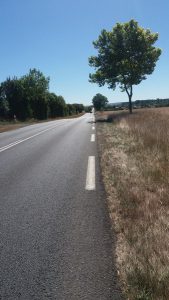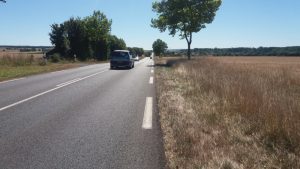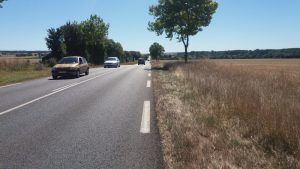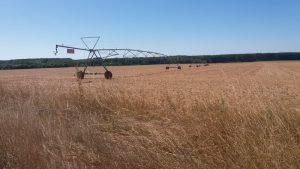OK. Another up and down day both topographically and, though less so, psychologically. It’s been very hot, felt far hotter than the 32°C (about 89°F?) that the Garmin tells me it was at the end and the Navarre countryside is moderately hilly. However, I’ve treated myself to another hotel night and tonight the IT has just worked so I have ‘photos but I’m tired and want to go out and have a well earned drink and a sandwich so no philosophising again. (“Phew” is a perfectly legitimate comment: go on, who’ll post it?)
Started in Puenta la Reina, found small supermarket and loaded up with fruit juice and drinking yoghourt. Here’s that bridge she built again, this time from the other side, from the modern bridge I was on.

Oh, by the way, I may have underestimated that queen, forgot to add this more modern message last night:

I think that was reminding me about what in our family is called “girls go best”.
OK. Then up into the first climb of the day:
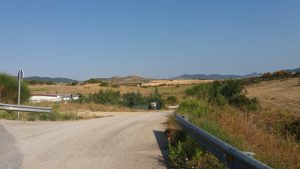
Puenta la Reina has disappeared behind and Toto and I were pretty much alone a fair way above.
After a lot of hills, including some exhilarating descents (not the 72kph I hit coming down into Roncevalles the other day though) I pushed on the chainwheel change lever to get a nasty “snap” sound and no change. OK. Thank goodness it’s leaving me with only the small chain ring, I will adopt J’s approach to cycling from here on: if it’s downhill she freewheels.
Actually, that did seem it might lose me some time so I found a bike shop in Estella (OK, Google maps was great for that) and the lovely man confirmed it was the selector built into the brake pull that had snapped and not the cable and that he couldn’t fix it. Actually, quite a bit of that was agreed with the help of my daughter on the ‘phone from London which amused the bike shop no end. Onward to Logroño thought I and onward we went.
Actually, up we went again and the road went right and the true Camino path went left and was unmetalled and nasty and steep but it went to the famous Irache monastery with the red wine fountain for pilgrims: I had to do that. I did but had no puff for any amicable “Buen Camino” as I went past a walker. Here’s the fountain, red wine on the left, water on the right.
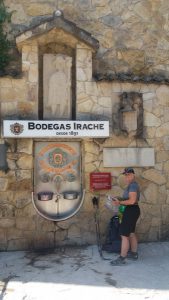
And that’s the lady I had passed rather rudey. From Toronto and very forgiving about my faux pas but very wary of the wine which was actually fine, I didn’t risk more than two tiny swigs though. The water was also lovely.
However, I decided to rubberneck a bit and was immediately rewarded as a black redstart showed me where to park my bike. (On the right in case you’re wondering.)

The monastery is superb, famous for its cloisters but the main church is wonderful.



And that’s just gotten us in the west door.

The crossing and … the cloisters …



Then it was back onto the old main road: great road surface much of the time and twenty minutes between cars and longer between cyclists (I think seven in the whole day). However, it’s a savage looking landscape.

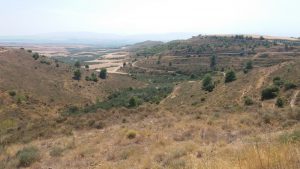

And oh boy the road does go up and down.
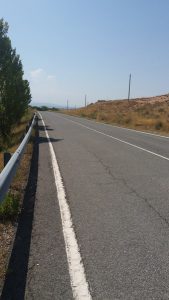
But Toto’s remaining 11 gears, and my legs, just, got us to Logrño. Here’s how it welcomes you, way out the boondocks.

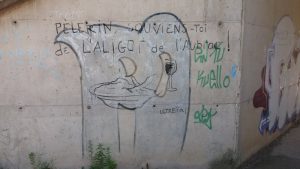
Lots of the small graffiti are from walkers to other walkers they’ve met before wishing them good luck. I suspect that the shade in these underpasses helps encourage what is clearly a local tradition.
The first very nice cycle shop man looked at the bike and made all sorts of noises and, no doubt, very articulate Spanish comments on the seriousness of the broken gear changer and the extreme low probability of ever finding such a part (damn Campagnolo) without cycling to Italy. At least, I think that’s what he was saying. To be fair, he pointed me to another bike shop, OK, it was the other side of town but I had to go that way really and they were … closed so:

I’m sure I’d be thrown off the Vuelta a España for such flagrant doping but the coffee and beer did wonders and actually the cycle shop was only 50m away and opening in 15 minutes.
So here we are:

Evidence of man without bike.
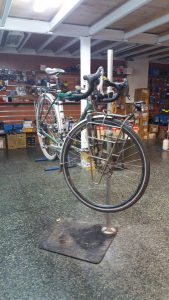
Bike in the bike hospital. If you look closely, you can see that the left brake lever is black and the right is the original aluminium one. Amazingly, the lovely man in this shop had a nearly new second hand lever and his young technician fitted it while I found a place for the night and this:
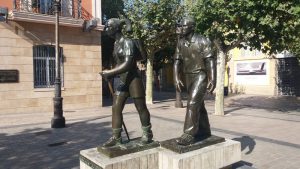
We started with women leading by example and ended on the same note. Good night. Bonne nuit. Buenas noches! 613km to Santiago according to Google maps.



